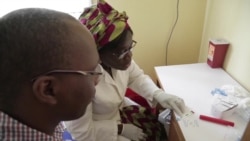The prevalence of HIV/AIDS is relatively low in West Africa compared to the rest of Africa, but treatment rates there are equally low, say activists and health care workers. In Ivory Coast, about two-thirds of people living with HIV/AIDS are not on antiretroviral treatment.
Stéphane Alliali Dié Kouamé walks one neighborhood in Abidjan every day to visit people living with HIV/AIDS.
"I encourage you to take your treatment so you can get better. Have they already done the last test for the child?" Kouamé asks a woman holding a baby.
"No, but I have the first one," the woman replies.
"And what did it say? Oh, negative," Kouamé remarks.
Treatment with antiretroviral drugs can reduce mother-to-child transmission during pregnancy and birth.
Kouamé works for the local NGO Lumière Action, which runs a treatment center nearby. He says people fall out of treatment for many reasons.
Some become discouraged. Some become misguided by charlatans touting cures. Others don't have enough money to pay for transport to the clinic. And then, there is the stigma.
"Just last week, a couple came to the clinic and they recognized one of the nurses, so they didn't want to come back to get their treatment. They asked me to bring it to them," Kouamé said. "They stigmatize themselves sometimes."
The clinic also offers free HIV tests. Ivory Coast made antiretroviral medications free in 2008.Since then, the percentage of people on ARV's has doubled to about 30 percent, but aid groups say that is still too low.
Low ARV Stocks
Clinics frequently run out of stock.
"For first line treatment, there is no problem. But for the second line, there are always stocks outs. We are people living with HIV/AIDS. We are told we have a lifelong treatment to follow. We cannot understand that today there are stock outs," says Leontine Sidye of RIP PLUS, a coalition of 68 local NGO's working on HIV/AIDS.
Since last year, an alert system has been implemented. When a clinic runs out of stock, it contacts RIP PLUS. The group gets in touch with the Ivorian authorities to try to get the medicine.
Treatment with antiretroviral drugs can slow the virus' spread in the body and delay the onset of AIDS.
Antiretroviral drugs or ARV's, in Ivory Coast are financed by initiatives like The Global Fund to Fight AIDS, Tuberculosis and Malaria and PEPFAR (The U.S. President's Emergency Plan for AIDS Relief), along with the government, but the demand remains high and so is the cost.
"We could better the situation by producing the ARV's locally. Not necessarily within the country, but within the sub-region. That could lower the costs," says Tamsir Sall, a UNAIDS representative in Ivory Coast.
About 80 percent of ARV's used in Africa are imported from abroad and many countries are pushing to produce locally. South Africa recently announced the creation of a state-owned company to manufacture ARV's there.






